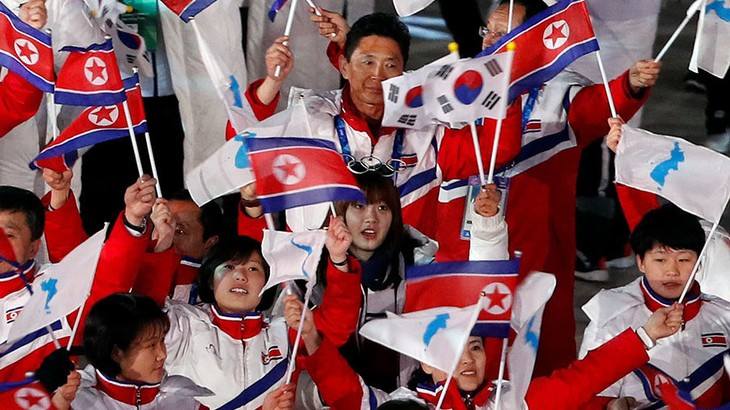(VOVWORLD) - An inter-Korean summit between South Korean President Moon Jae-in and North Korean leader Kim Jong-un will take place in the Panmonjom truce village on Friday. The meeting, which takes place after 6 years in which Kim Jong-un has pursued nuclear weapon and long-range missile program, is a rare opportunity for denuclearization and peace on the Korean peninsula.
 North, South Korean athletes in a joint parade at the 2018 Winter Olympic North, South Korean athletes in a joint parade at the 2018 Winter Olympic |
The inter-Korean summit is scheduled to be held at the Peace House in Panmunjom. This will be the first inter-Korean summit since 2007 and the 2nd since 2000. There will be a welcoming ceremony, talks, and a gala dinner attended by the two leaders.
Different from previous meetings
The first inter-Korean summit took place in 2000 in Pyongyang between North Korean leader Kim Jong Il and South Korean President Kim Dae Jung. At that time, North Korea was in an economic crisis and Kim Jong Il was seeking foreign support. At the end of the meeting, the two leaders signed an agreement to reduce tension and promote reconciliation on the Korean peninsula. The Diamond Mountain Resort and the Kaesong Industrial Zone were founded as a result of the meeting.
7 years later, a 2nd inter-Korean summit was attended by Kim Jong Il and South Korean President Roh Moh Huyn. The meeting ended with a cooperative agreement on developing the Kaesong Industrial Zone. The two Koreas called for a permanent peace agreement on the Korean peninsula and urged international talks on an agreement to replace the armistice agreement. They agreed to set up a joint fishing zone in a disputed sea area and organize regular summits.
The 3rd summit will be held amidst continuing economic difficulties in North Korea due to sanctions. The US and South Korea are working closely to prepare for the summit, where the two Koreas will discuss denuclearization, peace on the Korean peninsula, and ways to improve bilateral ties.
Skepticism and hope
At the end of the summit, the two Koreas are expected to release an announcement on ending hostile activities to replace their 1953 armistice agreement but it’s not certain that the two leaders will set a time frame or scale for denuclearization or reduction of conventional weapons. They are likely to do little more to reaffirm the goals of denuclearization, peace, humanitarian aid, and improvement of bilateral ties.
Pyongyang’s commitment to denuclearization is unclear. It made several promises the meeting like it did the same before in previous meetings.
North Korea’s agreement to denuclearize is likely to be contingent on conditions unacceptable to the US. The US has repeatedly opposed the gradual denuclearization. It wants the North to give up its nuclear program before any concessions are made.
After the two previous summits, the inter-Korean relationship has improved but has been shadowed by repeated tensions. It is hoped that this 3rd summit will defuse those tensions and reduce the risk of war.